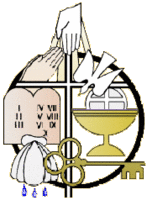Becoming a Christian
Q: It seems that I’m being drawn toward the Christian Church through conversations with friends. My question, which it may seem like I'm avoiding, is thus: how do I go about becoming a Christian. Are there prerequisites that would stop me from becoming one or any such thing?
A: It all comes down to belief in Christ as Savior. This means knowing Him as true God and true man, believing that He suffered, died, and was buried, that He bodily rose, and that He will return in judgment to bring the believers to heaven.
Different churches emphasize different things, but true Christians all practice baptism, since it is not only a washing away of sins but also a means by which God names and claims you as His own. Some church bodies deny baptismal regeneration and only treat it as a symbolic act, but even if they don’t realize what God does through it, God doesn’t stop the doing. Thus, if you have not yet been baptized, it will be part of your formal entry into the Christian Church. However, since the Word of God is already actively working in your heart, you may already be a Christian, although one still searching and, perhaps, a bit confused.
Entry and participation in the Church also includes repentance. True repentance means not only knowing that you are a sinner and even sorry, but desiring to turn away from your sins and toward God and a life of righteousness. Since you have already been led in this direction, we have evidence that He is already active in you, for natural man does not choose God. Only when God works in and on us can we work in response. Thus, although you may not be fully incorporated into the church, you are either already a Christian or are standing in the doorway, being led in by the work of the Holy Spirit.
In the Lutheran Church, as in many others, there is a time of instruction, or “catechesis.” If done well, catechesis not only covers basic doctrine (teaching and beliefs) but also many of the practices. When I teach adult or youth instruction classes, I not only speak of what we do in worship, prayer, Bible study, and the like, but also why we do it, what the historical context is, and how God works through these actions.
 Much of Lutheran catechesis is done on the basis of the Small Catechism, as illustrated by the accompanying graphic. This brief summary of Biblical doctrine covers what we call the Six Chief Parts of Christian Doctrine. The Ten Commandments summarize God’s Law, as depicted by the stone tablets which Moses received on Mount Sinai. The Apostles’ Creed confesses God, including who He is and what He does, with an emphasis on our salvation. The graphic symbolizes the Creed through the outpouring hand (the Father), the central cross (the Son, Jesus Christ our Lord), and the dove (the Holy Spirit).
Much of Lutheran catechesis is done on the basis of the Small Catechism, as illustrated by the accompanying graphic. This brief summary of Biblical doctrine covers what we call the Six Chief Parts of Christian Doctrine. The Ten Commandments summarize God’s Law, as depicted by the stone tablets which Moses received on Mount Sinai. The Apostles’ Creed confesses God, including who He is and what He does, with an emphasis on our salvation. The graphic symbolizes the Creed through the outpouring hand (the Father), the central cross (the Son, Jesus Christ our Lord), and the dove (the Holy Spirit).Prayer, our talking to God, includes the Our Father (or Lord’s Prayer). The visual for this is the praying hands. Baptism in the name of the Triune God (Father, Son, and Holy Spirit) is depicted by the shell and three drops of water. The Fifth Chief Part involves repentance, confession, and forgiveness. The key symbolizes Absolution, since forgiveness unlocks heaven for the believer. The Lord’s Supper, wherein we receive the body and blood of our Savior with the earthly elements of bread and wine is shown by the chalice and host — a technical term for the “wafer” of bread often used in Communion.
I don’t know where you are or I’d offer to help find a pastor to sit and talk with you. As it is, I pray that you are led to someone who will feed you the pure Word of God and teach you the blessings of forgiveness and of eating and drinking the body and blood of Christ. May you be taught the truth of Holy Scripture, which, as Paul notes, “is breathed out by God and profitable for teaching, for reproof, for correction, and for training in righteousness, that the man of God may be competent, equipped for every good work. (2 Timothy 3:16-17)”
God give you the humility, the courage, the honesty, and — above all — the faith to continue your pilgrimage into the Church and, through your life in it, to everlasting life.
Scripture quoted from The Holy Bible, English Standard Version™, © 2001 by Crossway Bibles.
Send email to Ask the Pastor.
Walter Snyder is the pastor of Holy Cross Lutheran Church, Emma, Missouri and coauthor of the book What Do Lutherans Believe.

0 Comments:
Post a Comment
<< Home